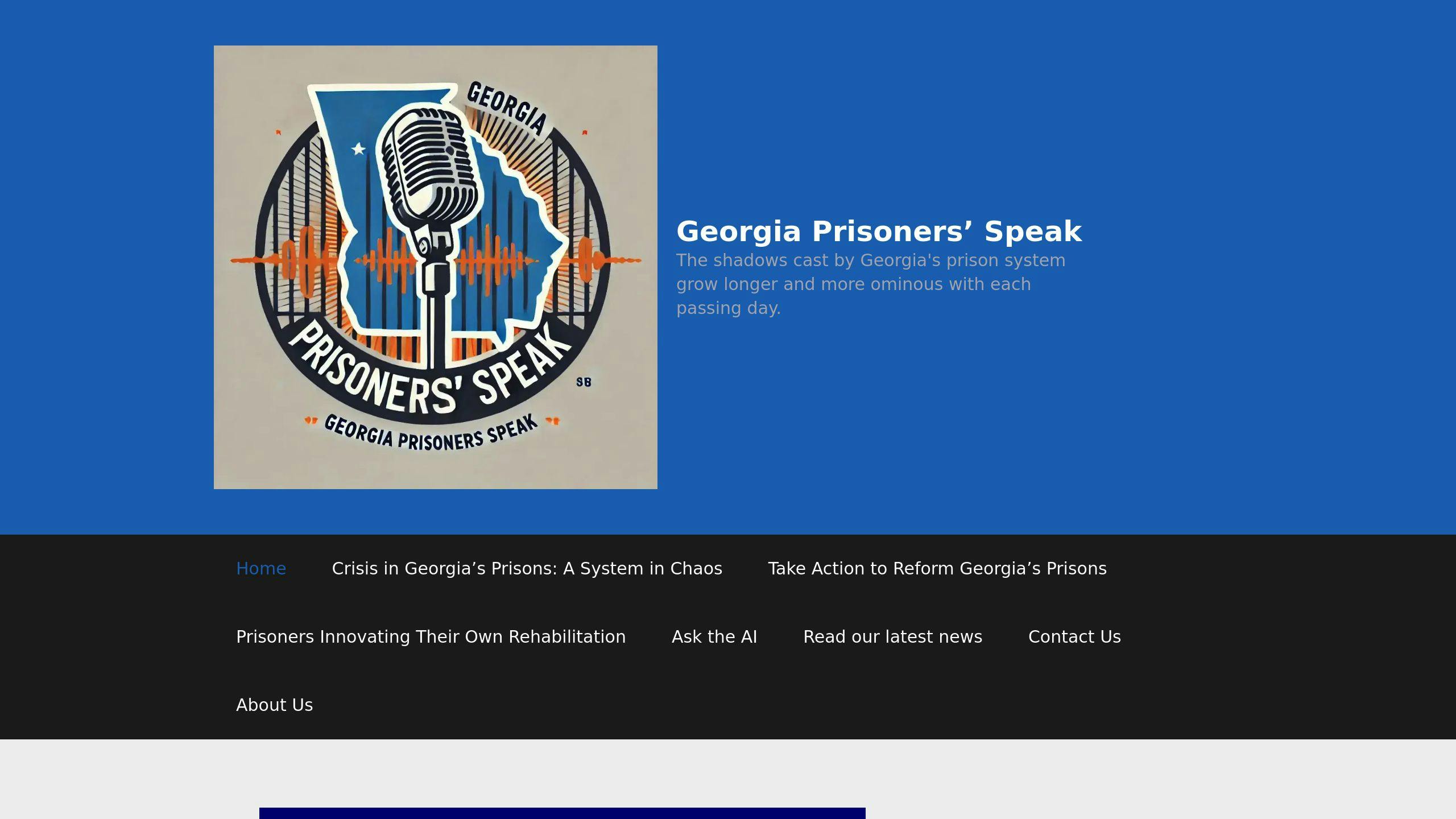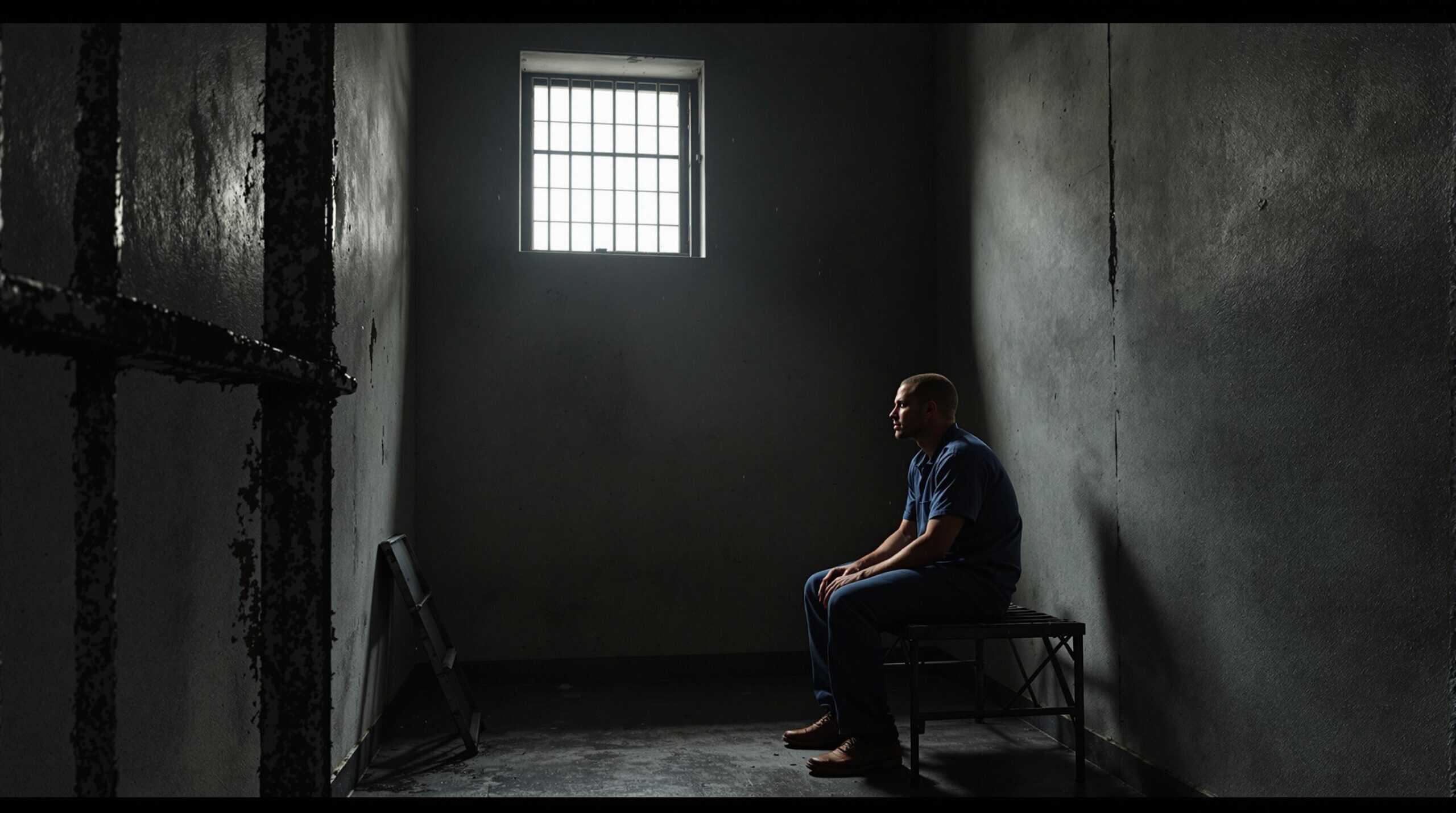Georgia’s prison system is in crisis. Former inmates reveal harsh conditions, including overcrowding, unsafe living environments, inadequate healthcare, and rampant violence. These systemic failures contribute to a high recidivism rate of 30% within three years of release.
Key Issues:
- Overcrowding & Poor Living Conditions: Cells exceed capacity by 30%, with issues like mold, broken plumbing, and extreme heat.
- Healthcare Gaps: 68% of inmates wait over a month for medical care, and only 22% with mental health conditions receive consistent treatment.
- Safety Concerns: Violence and gang control are rising, with homicides in prisons increasing by 95.8% between 2021 and 2023.
- Rehabilitation Barriers: Limited access to education, vocational training, and reentry programs leaves many unprepared for life after release.
These failures extend beyond prison walls, affecting public safety and community well-being. Reform efforts, led by organizations like Georgia Prisoners’ Speak (GPS), aim to address these issues by amplifying inmate voices and advocating for systemic change.
DOJ Finds Unconstitutional Risk of Harm Inside Georgia Prisons
Daily Life in Georgia Prisons
Life inside Georgia’s prison system is marked by constant challenges that highlight deep-rooted issues. These problems affect nearly every aspect of daily life for inmates.
Overcrowding and Cell Conditions
Overcrowding and unsafe living conditions are widespread in Georgia’s prisons. At Georgia State Prison, cells meant for two inmates often hold three, exceeding capacity by 30% [5].
A 2021 Department of Justice investigation revealed serious infrastructure problems in many facilities. Inmates regularly deal with:
- Chronic plumbing issues
- Dangerous heat levels
- Mold infestations
- Broken windows and poor air circulation
"The conditions in Georgia’s prisons are not just uncomfortable, they’re inhumane. We’re seeing systemic failures that compromise the basic dignity and safety of inmates", said Sarah Geraghty, Managing Attorney at the Southern Center for Human Rights [1].
Food, Water, and Hygiene
Basic necessities like food and water are a major concern. With a daily food budget of just $1.75 per inmate – well below the national average [1] – meals are often:
- Cold or undercooked
- Missing fresh produce
- Too small to meet nutritional needs
Water quality is another issue. At Autry State Prison, inmates report discolored, undrinkable water [3].
Basic Necessities
Access to essential items is a persistent struggle. Female inmates, for example, often lack adequate feminine hygiene products, as reported by Georgia Prisoners’ Speak [3].
Clothing and bedding are also problematic. Inmates wear the same worn uniforms for months and face cold winters with insufficient blankets. At Macon State Prison, a lawsuit from the Southern Center for Human Rights revealed cases where 96 inmates had to share a single toilet, underscoring the severe deprivation [5].
Healthcare and Mental Health in Prisons
Georgia’s prison system faces serious healthcare challenges, with former inmates describing these issues as life-threatening. From staff shortages to limited mental health services, the system struggles to meet even the most basic needs.
Medical Services
A critical shortage of medical staff – 45% of positions remain unfilled – has led to dangerous delays in care, especially for chronic illnesses. A 2023 report revealed that 68% of inmates waited over a month for treatment [6]. Many experienced worsening health conditions during this time.
Routine care is often delayed by weeks due to staffing gaps, while high co-pays and transportation problems make it nearly impossible for inmates to see specialists when needed.
Mental Health Issues
Mental health care in Georgia’s prisons is severely lacking. Despite 55% of inmates having diagnosed mental health conditions [1], only a small fraction receive consistent treatment. A 2023 University of Georgia study found that just 22% of these inmates received regular mental health care during their incarceration [7].
Solitary confinement exacerbates the problem. A 2024 report from the Georgia Advisory Committee to the U.S. Commission on Civil Rights highlighted that inmates in solitary confinement are three times more likely to attempt suicide than those in the general prison population [2].
Impact of Neglect
The effects of untreated health issues don’t end with incarceration. 64% of inmates develop mental health symptoms while in prison, and 31% meet PTSD criteria after release [4]. These struggles contribute to a recidivism rate of 30% mentioned earlier.
The lack of appropriate healthcare directly undermines rehabilitation efforts. According to Georgia Prisoners’ Speak, 72% of inmates with severe mental illnesses are housed in general population units without proper support, often leading to preventable deaths [8]. These gaps reveal a system that fails its inmates and, by extension, the broader community.
sbb-itb-7858f51
Safety and Violence in Prisons
Beyond healthcare issues, safety concerns add another layer to the crisis. Homicides in Georgia prisons surged by 95.8% between 2021 and 2023, with 94 deaths linked to failures in security and staffing [5].
Violence and Gangs
Federal investigators have found that gang-affiliated inmates now control housing assignments in some prisons, using violence to maintain their power [6]. Contraband cell phones, which can cost as much as $700 each, allow gangs to plan activities and organize attacks [6].
The staffing shortage has reached alarming levels. In 18 Georgia Department of Corrections (GDC) prisons, more than 60% of correctional officer positions are unfilled, with 10 facilities reporting vacancy rates over 70% [5]. This lack of staff leaves inmates exposed to violence and exploitation.
"The combination of violence, inadequate staffing, and poor living conditions has created an environment where people suffer needlessly and prisons don’t function as they should." – Kristen Clarke, Assistant Attorney General for Civil Rights [12]
Abuse by Correctional Officers
Former inmates have described widespread abuse by prison staff, including physical assaults, verbal harassment, and neglect during medical emergencies. The Justice Department’s investigation found that Georgia prison officials often show "deliberate indifference" to this abuse [4].
There’s also a troubling pattern of retaliation against inmates who file grievances. The Justice Department’s 2024 report highlights cases where officers ignored emergencies or used excessive force during routine procedures, fostering a climate of fear and intimidation.
Solitary Confinement
Solitary confinement frequently extends far beyond its intended disciplinary purpose. Vulnerable inmates are often forced to choose between prolonged isolation or exposure to violence due to insufficient protective measures [6]. This practice worsens mental health issues, especially for those already dealing with psychological challenges.
Rehabilitation and Reentry Challenges
Educational and Vocational Programs
Georgia’s prison rehabilitation programs face major obstacles. At Smith State Prison, only 30% of eligible inmates can participate in educational programs due to limited capacity [1]. Vocational training, which has been shown to lower recidivism by 12%, is also out of reach for many because of staffing shortages [6]. These challenges make it even harder for inmates to prepare for life after release.
Reentry Barriers
Even those who complete these programs often struggle after leaving prison. A staggering 62% remain unemployed a year later, with criminal records being the main hurdle, according to the Georgia Justice Project (2023) [7]. On top of that, 40% face homelessness within their first year of freedom [4].
The technology gap adds another layer of difficulty. A 2023 report from the Georgia Tech Research Institute revealed that only 15% of released inmates felt ready to use modern technology in daily life [10]. This lack of digital skills affects their ability to find jobs and manage finances.
Survival often takes priority over long-term planning. The Federal Reserve Bank of Atlanta reports that 70% of former inmates in Georgia have less than $500 in savings upon release, and 30% don’t have access to basic banking services [11].
Mental Health After Release
Mental health challenges are another major issue for those reentering society. A 2023 study in the Journal of Correctional Health Care found that 65% of former Georgia inmates experienced symptoms of mental health disorders within six months of release [2]. Common issues include PTSD, which can lead to employment and relationship difficulties, as well as depression, anxiety, and substance abuse – all of which increase the risk of returning to prison.
Staff shortages also limit the reach of programs like GA-PRI, which provides reentry support. While participants in the program are 24% less likely to reoffend within three years [8], only about 30% of eligible individuals receive full access to these services [5].
Advocacy for Reform: Georgia Prisoners’ Speak

Sharing Inmate Stories
Georgia Prisoners’ Speak (GPS) collects and shares firsthand accounts of prison conditions in Georgia. Using their platform at gps.press, they gather testimonies through a strict verification process, which includes cross-checking with official records [3].
These verified stories connect systemic problems like understaffing and violence to tangible reform efforts. For example, when GPS exposed critical issues at Smith State Prison, their reports led to state intervention and the introduction of new safety measures [5].
GPS also circumvents communication barriers within prisons by using anonymous and verified reporting channels [1].
Public Awareness and Accountability
GPS’s evidence played a key role in supporting the 2021 Department of Justice investigation into Georgia’s prison system [1]. By 2024, GPS saw a significant rise in visibility, with triple the media mentions, increased legislative citations, and double the website traffic compared to previous years.
"We believe that prisoners should have a say in the conditions they live in. We want to empower prisoners to advocate for themselves and to be a part of the solution." – BT, primary spokesperson for GPS [1]
This statement reflects GPS’s mission to give prisoners a voice and involve them in creating solutions for the challenges they face.
To push for change, GPS collaborates with legal groups, universities, and media outlets. One partnership with Georgia State University expands on earlier research about the risks of suicide in solitary confinement [3].
Their newest project focuses on addressing retaliation risks. GPS is working on a secure mobile app that allows families to report prison conditions safely during visits, building on earlier findings [4].
Conclusion: The Need for Change
Stories from former inmates reveal a system riddled with failures: unchecked violence, neglect of constitutional rights, and untreated mental health issues [4][5]. These problems – ranging from overcrowded facilities to ignored mental health needs – don’t just stay behind bars; their consequences spread far and wide.
The Department of Justice has highlighted "deliberate indifference" to both violence and constitutional violations within Georgia’s prisons [4]. This points to the depth of the crisis.
"The conditions in Georgia’s prisons are not just a humanitarian issue, but a public safety concern. We must invest in rehabilitation to break the cycle of recidivism." – Sarah Thompson, Executive Director, Georgia Justice Project [2]
There are proven ways to tackle these problems. Community-based rehabilitation programs, for instance, have shown they can address systemic issues while cutting costs [9]. Expanding mental health care, filling staffing gaps, and ensuring access to rehabilitation programs are all practical steps Georgia can take. Even tools like telemedicine could make a difference in healthcare access right away.
The firsthand accounts collected by GPS highlight that real change means involving incarcerated individuals in shaping policies. Their experiences provide a clear call to action for policymakers, advocates, and the public to join forces in transforming Georgia’s prison system. The goal? A system that respects constitutional rights, emphasizes rehabilitation, and improves public safety.

1 thought on “Former Inmates Share Life Inside Georgia Prisons”